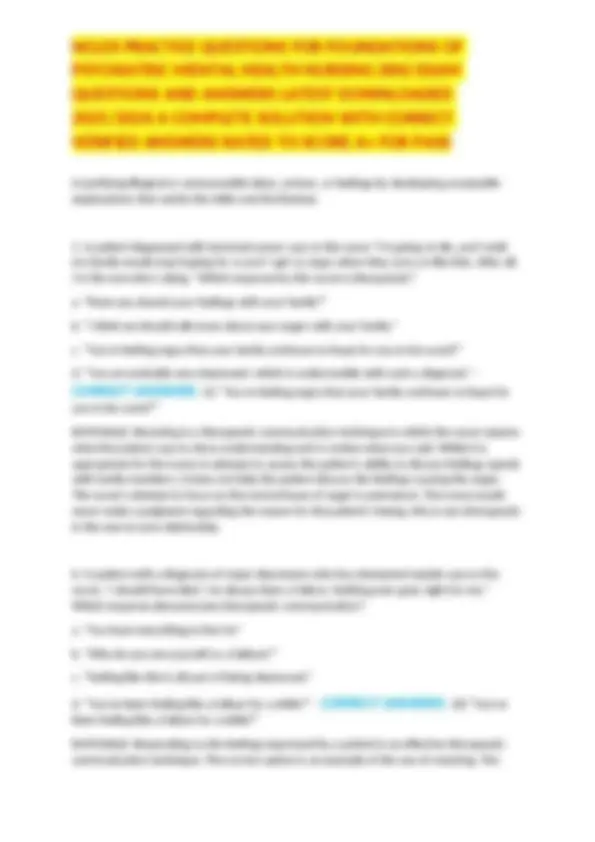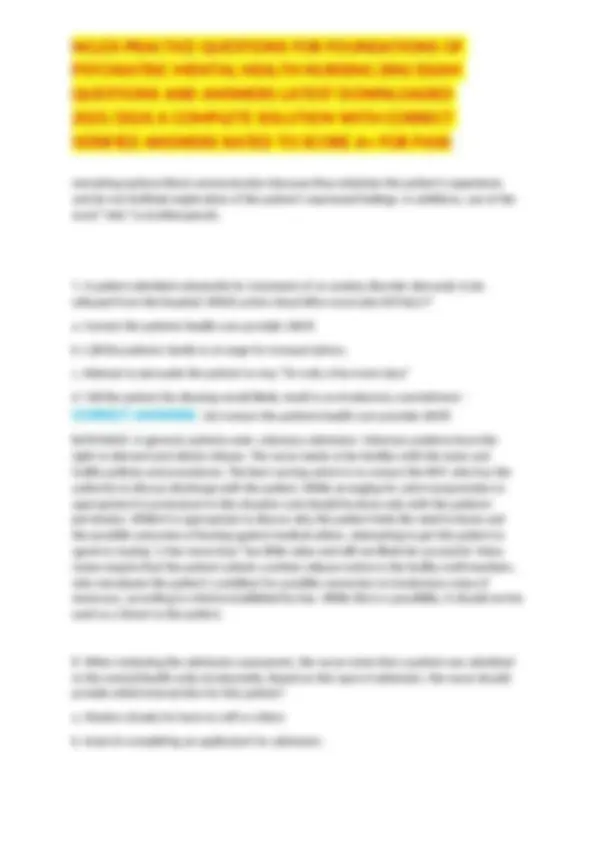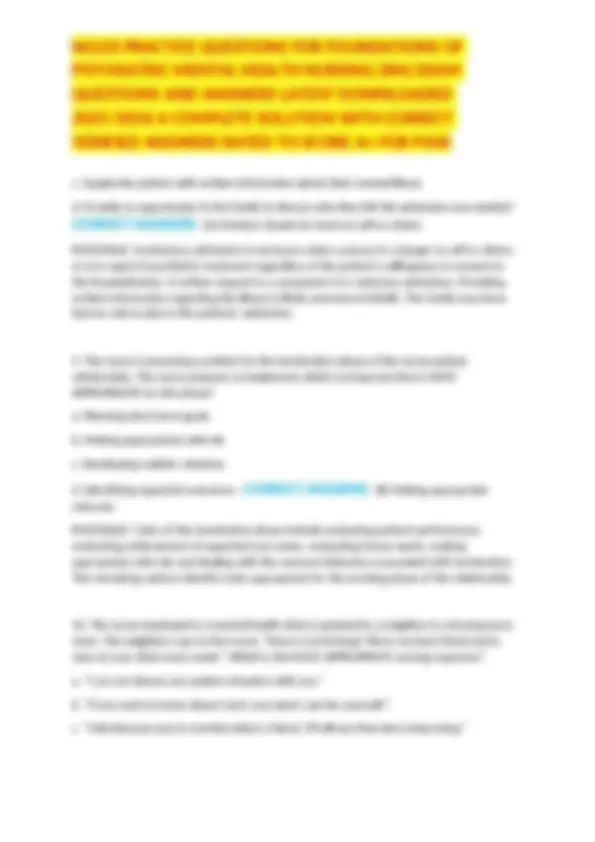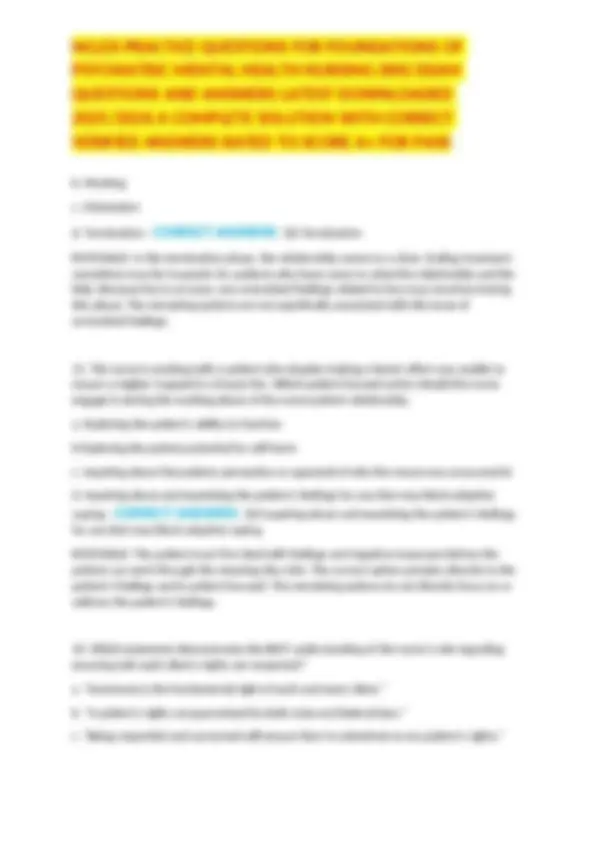







Study with the several resources on Docsity

Earn points by helping other students or get them with a premium plan


Prepare for your exams
Study with the several resources on Docsity

Earn points to download
Earn points by helping other students or get them with a premium plan
Community
Ask the community for help and clear up your study doubts
Discover the best universities in your country according to Docsity users
Free resources
Download our free guides on studying techniques, anxiety management strategies, and thesis advice from Docsity tutors
NCLEX PRACTICE QUESTIONS FOR FOUNDATIONS OF PSYCHIATRIC MENTAL HEALTH NURSING (RN) EXAM QUESTIONS AND ANSWERS LATEST DOWNLOADED 2025/2026 A COMPLETE SOLUTION WITH CORRECT VERIFIED ANSWERS RATED TO SCORE A+ FOR PASS
Typology: Exams
1 / 9

This page cannot be seen from the preview
Don't miss anything!






RATIONALE: In general, patients seek voluntary admission. If a patient seeks voluntary admission, the most likely expectations is the patient will participate in the treatment program since they are actively seeking help. The remaining options are not characteristics of this type of admission. Fearfulness, anger, and aggressiveness are more characteristic of an involuntary admission. Voluntary admission does not guarantee a patients understanding of their illness, only of their desire for help.
Restating, Listening, Maintaining neutral responses, Providing acknowledgment and feedback RATIONALE: Therapeutic communication techniques include listening, maintaining silence, maintaining neutral responses, using broad openings and open-ended questions, focusing nd refocusing, restating, clarifying and validating, sharing perceptions, reflecting, providing acknowledgment and feedback, giving information, presenting reality, encouraging
formulation of a plan of action, providing nonverbal encouragement, and summarizing Asking why is often interpreted as being accusatory by the patient and should also be avoided. Providing advice or giving approval or disapproval are barriers to communication.
(A) Using open-ended questions and silence RATIONALE: Open-ended questions and silence are strategies use to encourage patients to discuss their problems. Sharing personal food preferences is not a patient-centered intervention. The remaining options are not helpful to the patient because they do not encourage the patient to express feelings. The nurse should not offer opinions and should encourage the patient to identify the reasons for the behavior.
RATIONALE: Denial is refusal to admit to a painful reality, which is treated as if it does not exist. In projection, a person unconsciously rejects emotionally unacceptable features and attributes them to other persons, objects, or situations. Regression allows the patient to return to an ealier, more comforting, although less mature, way of behaving. Rationalization
remaining options block communication because they minimize the patient's experience and do not facilitate exploration of the patient's expressed feelings. In additions, use of the word "why" is nontherapeutic.
RATIONALE: In general, patients seek, voluntary admission. Voluntary patients have the right to demand and obtain release. The nurse needs ot be familiar with the state and facility policies and procedures. The best nursing action is to contact the HCP, who has the authority to discuss discharge with the patient. While arranging for safe transportation is appropriate it is premature in this situation and should be done only with the patients' permission. While it is appropriate to discuss why the patient feels the need to leave and the possible outcomes of leaving against medical advice, attempting to get the patient to agree to staying "a few more days" has little value and will not likely be successful. Many states require that the patient submit a written release notice to the facility staff members, who reevaluate the patient's condition for possible conversion to involuntary status if necessary, according to criteria established by law. While this is a possibility, it should not be used as a threat to the patient.
c. Supply the patient with written information about their mental illness d. Provide an opprotunity fo the family to discuss why they felt the admission was needed -
RATIONALE: Involuntary admission is necessary when a person is a danger to self or others or is in need of psychiatric treatment regardless of the patient's willingness to consent to the hospitalization. A written request is a component of a voluntary admission. Providing written information regarding the illness is likely premature initially. The family may have had no role to play in the patients' admission.
referrals RATIONALE: Tasks of the termination phase include evaluating patient performance, evaluating achievement of expected out-comes, evaluating future needs, making appropriate referrals and dealing with the common behaviors associated with termination. The remaining options identify tasks appropriate for the working phase of the relationship.
b. "Really?" c. "You're having difficulty sleeping?"
difficulty sleeping?" RATIONALE: The correct option uses the therapeutic communication technique of restatement. Although restatement is a technique that has a prompting component to it, it repeats the patients major theme, which assists the nurse to obtain a more specific perception of the problem from the patient. The remaining options are not therapeutic responses since none encourage the patient to expand on the problem. Offering personal experiences moves the focus away from the patient and onto the nurse.
RATIONALE: Enial is refusal to admit to a painful reality and may be a response by a victim of sexual abuse. In this case the patient is not acknowledging the trauma of the assault either verbally or nonverbally. Projection is transferring one's internal feelings, thoughts, and unacceptable ideas and traits to someone else. Rationalization is justifying the unacceptable attributes about oneself. Intellectualization is the excessive use of abstract thinking or generalizations to decrease painful thinking.
b. Working c. Orientation
RATIONALE: In the termination phase, the relationship comes to a close. Ending treatment sometimes may be traumatic for patients who have come to value the relationship and the help. Because loss is an issue, any unresolved feelings related to loss may resurface during this phase. The remaining options are not specifically associated with this issue of unresolved feelings.
for any that may block adaptive coping RATIONALE: The patient must first deal with feelings and negative responses before the patient can work through the meaning the crisis. The correct option pertains directly to the patient's feelings and is patient-focused. The remaining options do not directly focus on or address the patient's feelings.